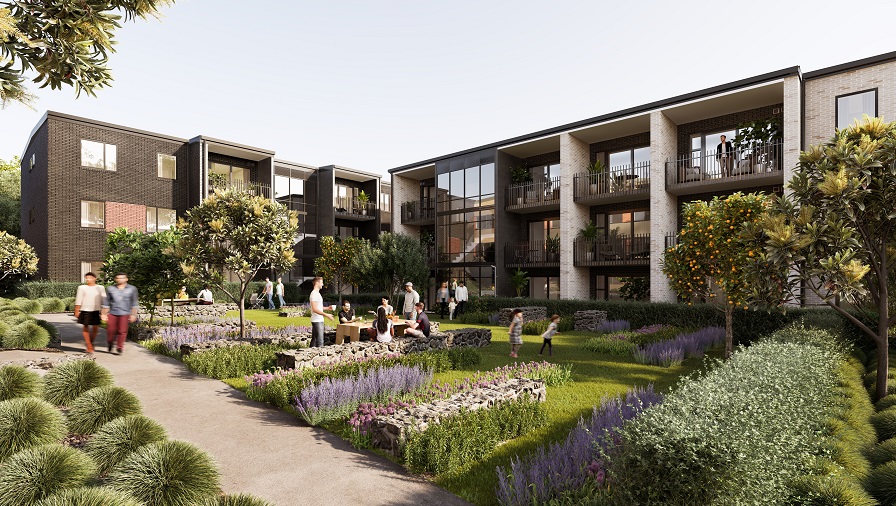Simplicity launches build-to-rent scheme
Purpose-built rental units are both a good investment and an answer to the housing crisis, it says.
Purpose-built rental units are both a good investment and an answer to the housing crisis, it says.
KiwiSaver provider Simplicity has launched a build-to-rent scheme, with the aim of following the European model and investing a chunk of its funds in the asset class.
Simplicity has joined forces with house builder NZ Living to create Simplicity Living.
Construction is underway on its first two projects, a 132-unit development in the east Auckland suburb of Point England, and a 60-unit site a few kilometres away in Oranga.
NZ Living owners Shane and Anna Brealey are donating the company’s team, expertise and subcontractor and supplier base to Simplicity Living, and will manage the venture on a pro-bono basis.
The intention was to build thousands of high quality, affordable homes for rent across New Zealand, Simplicity managing director Sam Stubbs said.
It was starting off with a couple of hundred apartments, but it would emulate the European pension funds which typically put between 5% and 20% of their money into build-to-rent developments.
“We're intending to be building, within 18 months, one home a day for rent, and so we’ll end up being a major supplier and really help to create a whole new option for living in New Zealand, which is very common overseas, but not here,” Stubbs said.

‘Fantastic investment’
Certain funds within the Simplicity KiwiSaver scheme, excluding its default fund, and the Simplicity Investment Funds would own and provide funding to Simplicity Living through a wholesale funding arrangement.
Build-to-rent was a safe investment because the last bill people won’t pay is the rent, Stubbs said.
Simplicity anticipated the returns from build-to-rent would be around twice what it could get from fixed interest assets.
“So, very good returns and very reliable, which is why pension funds put so much of their money in them.
“It creates a very long-term inflation adjusted bond that doesn't currently exist in New Zealand.
“We expect a whole bunch of other people will want to invest alongside with us in this, and we'll make it available to wholesale and retail investors when we get to scale.”
Asked how it would manage the illiquidity of build-to-rent, Stubbs said 95% of Simplicity’s funds could be liquidated within a day.
While build-to-rent was illiquid, it would only constitute a small proportion of each fund.
In any case, KiwiSaver in particular was a long-term investment and this was an opportunity to take advantage of long term returns.
Building for longevity
After creating a successful company, Anna and Shane Brealey said they wanted to devote the next phase of their lives to building as many affordable, quality homes for rent as possible.
NZ Living had built or nearly completed 700 homes in the last four years, and was one of the largest providers of KiwiBuild homes, Shane Brealey said.
“But it occurred to us that within three or four years of us helping those first-time homebuyers get on the property ladder, they will invariably sell at market rates.
“By teaming up with Simplicity, we can offer people a home for life, or a more affordable rental that, while they're there, they're able to save for their own home elsewhere.
“Then another party can benefit from that same asset, so it’s got longevity,” he said.
Simplicity will offer its members the first option to rent the homes.
It’s not the KiwiSaver provider’s first attempt at disrupting the home finance market.
In 2019 it began providing first home loans and currently offers a low 2.25% floating rate.

Viability of build-to-rent
Paul Winstanley, head of build-to-rent for commercial real estate firm JLL, applauded the launch of Simplicity Living, but said the philanthropic elements of the scheme made it the exception rather than the rule.
“Any institutional grade investment in build-to-rent is amazing, and it’s a great move forward,” he said.
However, New Zealand’s policy settings generally stood in the way of build-to-rent as a housing option.
The two big obstacles were removing tax deductibility on loans for existing residential property developments, and overseas ownership rules which barred overseas investors from investing in the asset class.
Mark Todd, co-founder of developer Ockham Residential, said the tax change may force him to sell 85 rental apartments, it was reported this week.
The sector needed a level playing field with other commercial property to be viable, Winstanley said.
“Unless we get interest deductibility, we don’t get a market, we just get the odd person doing these schemes.
“I’m hoping the message the government takes out of this is that they really do need to support the sector if they want to see more Simplicitys coming through.”
The sector was expecting an announcement from government on build-to rent this month, Winstanley said.
Sign up to get the latest stories and insights delivered to your inbox – free, every day.